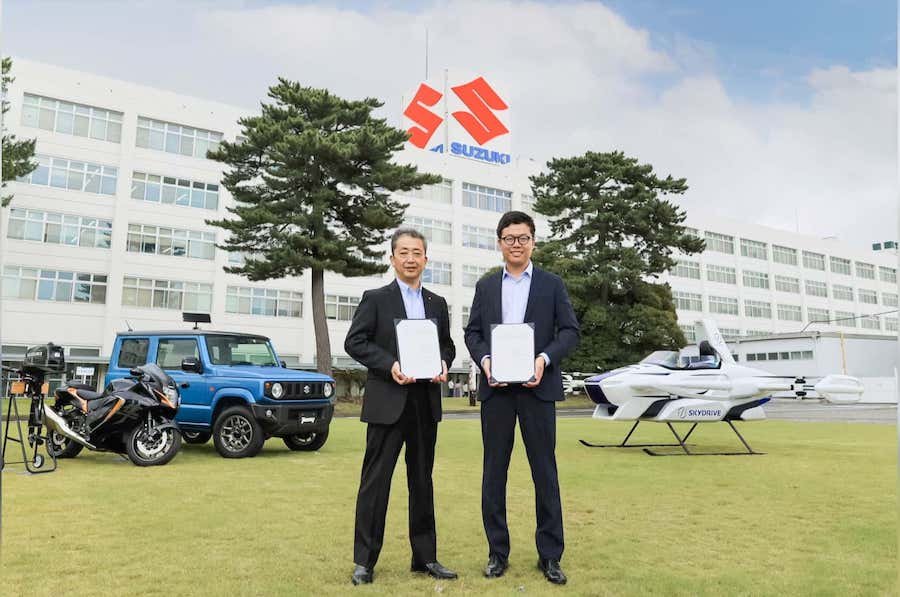Suzuki And SkyDrive Sign Agreement To Produce Flying Cars In Japan

Remember SkyDrive? It’s OK if you don’t because this is RideApart, not FlyApart. In 2022, the firm announced that it was teaming up with Suzuki to develop flying cars—or, more specifically, electric vertical takeoff and landing (eVTOL) machines for the Japanese market. At the time, SkyDrive also announced its intention to have its first vehicles up and flying by 2025.
Having goals is good, but what’s been going on behind the scenes over the past year? At the 2023 Paris Air Show in late June, SkyDrive officially announced that it had signed “a basic agreement” with Suzuki Motor Corporation to cooperate on manufacturing these vehicles. Production, the pair of companies says, should commence sometime in spring 2024.
The vehicle, which will also be called SkyDrive, has also changed specification in the past year. The new version of SkyDrive will have a three-person capacity, with room for a single pilot and two passengers. The old version only had room for a pilot and a single passenger. As a result, the dimensions of the SkyDrive will also increase slightly, and will now be 43 feet long by 43 feet wide by 10 feet high, including rotors.
Maximum takeoff weight has also increased, going from the previously allowed weight of 2,400 pounds to the current weight of 3,100 pounds. SkyDrive’s claimed maximum cruise speed of approximately 100 kilometers per hour (about 62 miles per hour), or 54 knots indicated air speed (kias). Operational flight range has increased to approximately 15 kilometers (about 9.3 miles), up from the previous version’s range of 5 to 10 kilometers (about 3 to 6.2 miles).
SkyDrive’s powertrain is a battery electric unit, and so far, it’s keeping the details close to its chest. Construction of the vehicle will involve a range of composites and aluminum alloys. Production of the new SkyDrive units will take place at a Suzuki facility located in Shizuoka, Japan.
SkyDrive’s Airworthiness Certification Plans
To pursue aviation with a vehicle you’ve built, you must first obtain airworthiness certification. SkyDrive plans to do this with its first eVTOL in 2025. After that, its next goal is to have SkyDrive ready to fly at the 2025 World Exposition in Osaka to show off what it can do. Once it’s leapt that hurdle, the next target is type approval certification, so it can begin mass production for the Japanese market in 2026.
What about plans outside Japan? Earlier in 2023, SkyDrive announced its intention to enter the US market, for which it also plans to obtain certification from the US Federal Aviation Administration. In January 2023, it announced plans to establish a home base in South Carolina.
“The decision to make South Carolina our home base and our window into the U.S. market was an easy one considering that it is a significant player in both the commercial and military aviation industries, and it is home to more than 400 aerospace and aviation companies including Boeing and Lockheed Martin. I sincerely believe that the vast number of resources available in South Carolina will provide SkyDrive with a substantial platform that enables us to achieve our goals,” SkyDrive founder and CEO Tomohiro Fukuzawa said in a statement.
Having goals is admirable, but the road between establishing goals and crossing them off your list isn’t always a direct one. We’ll be sure to keep you updated as and when developments—and eVTOLs—arise.
Related News


